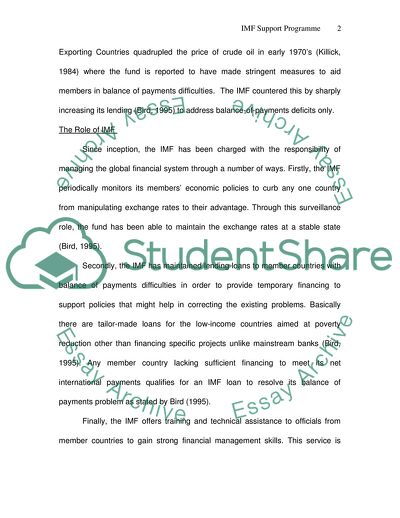
- Home
- Free Samples
- Premium Essays
- Editing Services
- Extra Tools
- Essay Writing Help
- About Us
- Studentshare
- Subjects
- Miscellaneous
- IMF Support Programme
IMF Support Programme - Essay Example

- Subject: Miscellaneous
- Type: Essay
- Level: Undergraduate
- Pages: 4 (1000 words)
- Downloads: 0
- Author: erichschultz
Extract of sample "IMF Support Programme"
It was not until early in 1947 when the fund began its financial operations officially, headquartered in Washington, D.C. The fund has grown tremendously over the years recording marked success in financing temporary balance of payments to distressed member countries thereby promoting international monetary cooperation as cited by Bird (1995). The IMF has on one hand faced numerous challenges in its endeavour to serve its members. A point in case was when the Organization of the Petroleum Exporting Countries quadrupled the price of crude oil in early 1970’s (Killick, 1984) where the fund is reported to have made stringent measures to aid members in balance of payments difficulties.
The IMF countered this by sharply increasing its lending (Bird, 1995) to address balance-of-payments deficits only. Since inception, the IMF has been charged with the responsibility of managing the global financial system through a number of ways. Firstly, the IMF periodically monitors its members’ economic policies to curb any one country from manipulating exchange rates to their advantage. Through this surveillance role, the fund has been able to maintain the exchange rates at a stable state (Bird, 1995).
Secondly, the IMF has maintained lending loans to member countries with balance of payments difficulties in order to provide temporary financing to support policies that might help in correcting the existing problems. Basically there are tailor-made loans for the low-income countries aimed at poverty reduction other than financing specific projects unlike mainstream banks (Bird, 1995). Any member country lacking sufficient financing to meet its net international payments qualifies for an IMF loan to resolve its balance of payments problem as stated by Bird (1995).
Finally, the IMF offers training and technical assistance to officials from member countries to gain strong financial management skills. This service is offered to
...Download file to see next pages Read MoreCHECK THESE SAMPLES OF IMF Support Programme
International Monetary Fund and World Bank
IMF's Stuctural Adjustment Programme
PRSP as an Indicator of Change
World Bank and IMF Policies in Developing Countries
Structural Adjustment
Effectiveness of the Karen Hilltribes Trusts Education
IMF Structural Adjustment Program
International Business Finance

- TERMS & CONDITIONS
- PRIVACY POLICY
- COOKIES POLICY